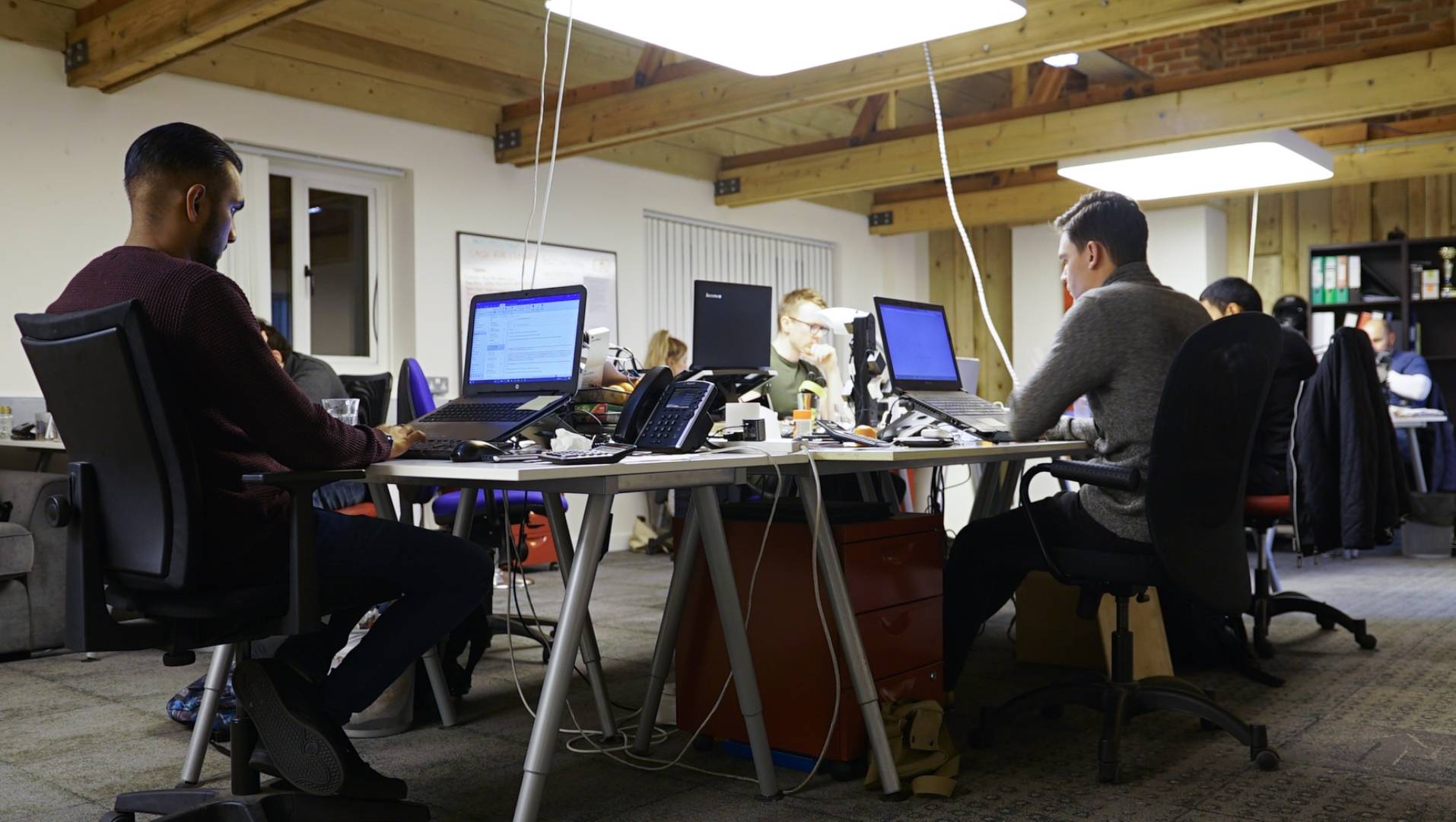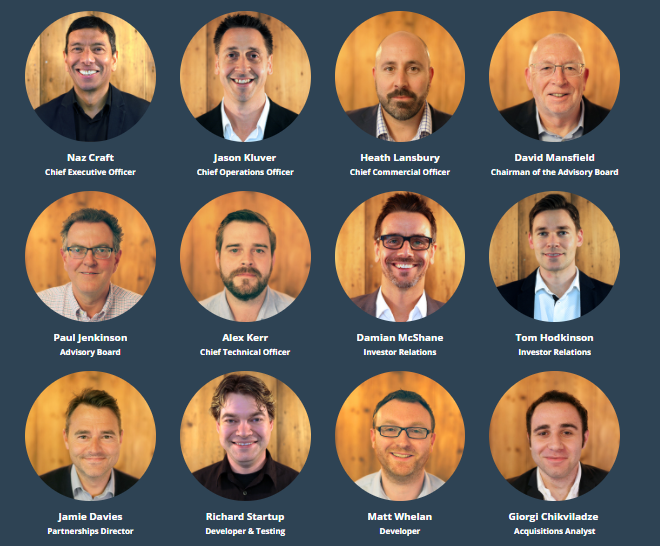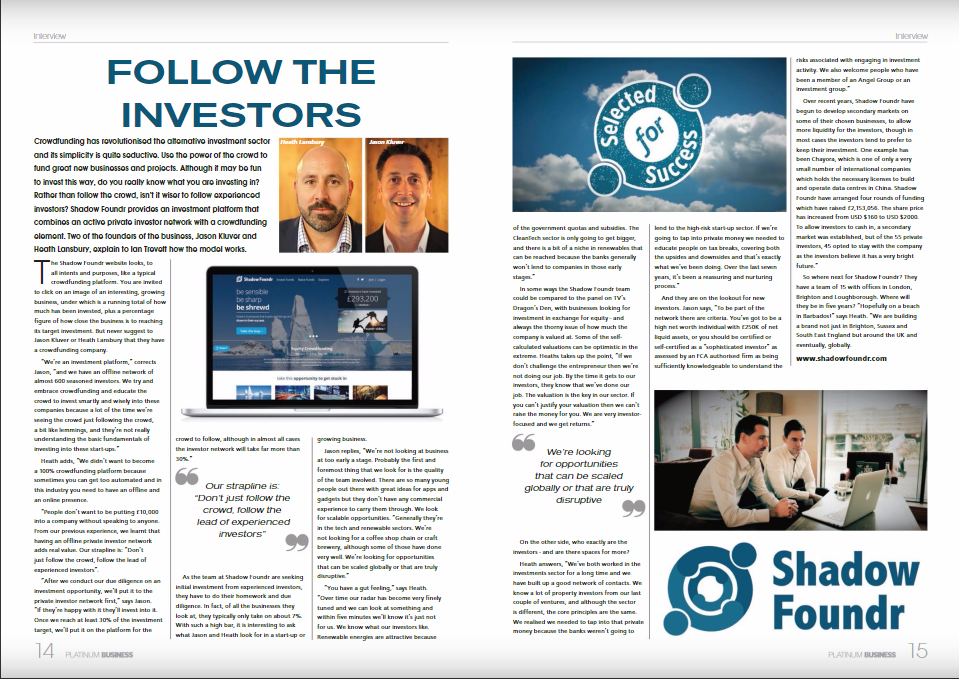Exclusive interview for SPINOFF.COM with Jason Kluver, Chief Operations Officer, Shadow Foundr, an investment platform which supports entrepreneurs and scalable businesses in the UK with early stage equity investments.
SOC: Dear Mr. Kluver, thank you very much for dedicating your time to this interview. We would like to start with an overview of your company, Shadow Foundr. Could you please elaborate on the story of its creation and the team? We would also like to hear few words about your vast experience as well.
Mr. Kluver: Sure, Shadow Foundr has been going now for just under three years. There was a group of us who were working in the angel investment space in London and the South East back in 2010. We were with a company called The Ideas Factory. That was great because we were seeing some very interesting propositions at a very early stage. The crowdfunding was just taking off and we were in that arena. We were looking at a crowdfunding model, but we weren't sure that it was going to take off because the regulations weren't in place and we weren't sure what was going to happen with the legal side of things. Then quite quickly a few competitor crowdfunding companies appeared which were pioneering this space in the UK. We watched them at first. Sometimes it’s good not be a first mover in the market and to see what happens in the market. We saw the mistakes as well as the good things. Then we realized in 2013 that crowdfunding was being accepted by the regulators and we thought we need to get involved, so a few of us started Shadow Foundr. We had a very solid investor network behind us from our previous business. They came along with us as well. Shadow Founder was formally created in 2015 and we became a fully authorized and regulated platform at the start of 2016. In that time, we built our platform as well. The whole premise was that we had a lot of investment experience, a lot of start-up experience and we wanted to be an investment platform which could help fund and scale businesses not just in the UK but also globally.
SOC: Mr. Kluver, from your pitch video we see that you support growing businesses with the equity financing, provide short term lending and property investments. Could you please describe in more detail what your company specializes in and what is the core of its activity? Is it only UK?
Mr. Kluver: Essentially, we have a little over 1000 professional investors on our platform and we introduce those investors to exciting, early stage businesses and some debt opportunities as well. We do that via an online investment platform. We also host a lot of off line presentations and meetings through our London presence. What we do is we introduce investors to these opportunities whether they are debt, equity or property opportunities. The property side of things is actually something that investors are very knowledgeable about because a lot of the investors in our portfolio made their money from property originally.
The whole funding model came out of the global financial crisis of 2005 because, back then, these investors wanted to get out of the property and invest their money elsewhere. We showed them the potential of investing in start-up businesses and we educated them on all of the tax advantages the UK government had in place for investors. We educate our investors, we give them opportunities and we let them meet the entrepreneurs as well. We let the entrepreneurs pitch to our investors and we then facilitate the funding arrangement between the investors and the startups via our online platform.
To date, in two and a half years, we've raised over £70 million for various opportunities. The majority of this has been raised in the last twelve months. We have gained quite a lot of traction. We've now funded 22 different businesses. Generally, we look to raise around £250k, but we have already funded up to £1.5 million for different opportunities.

SOC: Thank you, the numbers are quite impressive. SPINOFF.COM is mostly dedicated to life science spinoffs and we know that you are helping life science companies such as LIfT Biosciences, Fertility Focus etc. to find investors for their breakthrough technologies. Could you please tell us which problem you might solve for spinoffs founders and how your company can be helpful for them?
Mr. Kluver: For all early stage businesses funding is a big issue. It is very difficult to juggle raising funds for your business to help it grow and doing all the things that will enable your business to succeed. What we do is we take away that fundraising stress. As we have an experienced investor relations team, we take away a lot of the heavy lifting for the opportunities that we raise for. So, for example, Fertility Focus with their ovulation product and Lift Biosciences who are trying to find the cure for pancreatic cancer were both able to do their business while we looked after the fundraising. In the time that we've taken to raise funds for the companies, they've been able just get their heads down and continue with their research. LIfT has had two very big breakthroughs during our fundraising process, which is amazing. What it means is that these companies do not have to stop what they are doing to concentrate on fundraising; they can give it to us and we can look after it and they can continue to travel along their start-up path.

SOC: We totally agree with you. What do you look for when you are assessing a company to put in front of your investors?
Mr. Kluver: We have a lot of experience in this particular area. I've already mentioned that when we first got into this space back in 2010 with the previous company, we raised for a lot of very early-stage businesses. There were many great ideas, but having a great idea and executing it - these are two very different things. What we focus on is the execution of the idea as it's important that every start-up that comes to us has an idea that's potentially unique, scalable and disruptive. Our platform presents opportunities which can have a global impact and not just a new local coffee shop chain or craft beer specialist, not that there is anything wrong with such ventures. A big part of the execution of these ideas is the team. We look carefully at the team behind each idea. Quite often these are very bright young people with great ideas but without the commercial experience necessary to execute them. That's fine as long as they have a decent advisory board and people behind them who actually have that commercial spirit and a decent track record. That's key things we look out for are if the business idea is unique, disruptive, scalable, has a protected IP and also the right team to execute the opportunity and the idea.

SOC: Mr. Kluver could you provide some examples of your track record with the projects you have raised for?
Mr. Kluver: Most companies take a three to five years before they get proper traction. Lots of people say they will exit in three to five years but that's not realistic in our experience. More likely, exits take seven to ten years. This is a long term buy for investors. But we do have a couple of very good news stories. The first one is a company called Chayora; they're a developer of data centers in China and are one of just four or five companies which has the requisite regulatory permissions to develop data centers in China. We've done three funding rounds with Chayora. We started with two hundred dollars a share, then raised to four hundred and fifty dollars per share, then a thousand dollars a share. We did those rounds over a two-year period. Then Standard Chartered bank came and invested 20 million U.S. dollars into the company. It also gave them a 53-million-dollar debt facility. That 20 million dollars equity investment valued the company at one hundred million dollars. When this bank came in and purchased the shares at two thousand dollars a share all the initial shareholders enjoyed a 10 times uplift in their own share price - in just two years. This wasn't an exit in itself for investors, but because of Standard Chartered bank’s involvement and the establishment of a new share price, we were able to facilitate a secondary market for investors, thereby providing a liquidity opportunity. What that meant was that we asked investors if they wanted to sell some or all of their shares. We had 55 investors in the opportunity. They sold at a price just under two thousand dollars a share to some new investors and that gave them an exit opportunity. That we think was possibly the first instance of a secondary market facilitation through a crowdfunding platform. That was back in 2016. It was very good for our investors and very good for Chayora and since that point, they have started building their first data centers.
We also raised for another company called Honeycomb TV, a global delivery service platform for television advertising. Their technology is the precursor to programmatic television advertising which is the holy grail of advertising. We all know we about programmatic advertising online but what these guys are doing is working out the demographics of the smart TV audiences in specific households, so they can target specific advertising accordingly. It's exciting stuff. Honeycomb has been noticed by the largest global distributors of television advertising and in December they merged. That's another very good new story for investors, for Chayora out just on the numbers. We raised about 2,5 million dollars for them, and for Honeycomb it was around £300k. So very different levels but both very good stories.
SOC: Amazing results and exciting achievements of your team. Could you tell us what makes your company different from other investment platforms and probably what piece of advice you might give to spinoffers who are looking to raise funds with the investment platforms?
Mr. Kluver: I think the key difference with us is that we are very much investor focused. We work with the entrepreneurs, with the companies to get the best proposition for the investors. Because we're investor focused, we think it works in the entrepreneur’s favour because we let them know what the investors need. That's probably the biggest difference. I think also the fact that we have an off-line presence as well as online. I think that's a big factor as well. That offline presence actually allows us to have that face to face contact with the investors. They know and trust us more because of personal relationship we have with them. I think the other thing is that we know what it takes to get the due diligence done on companies; we understand it is about quality over quantity and that’s very important. We think if we can maintain a good track record and we keep delivering results, then our investors will keep investing. The fact is that if investors lose money from investing in startups they won't invest anymore. It's important that due diligence is done, a track record is maintained, and investors feel they're getting value from their investments, even it might be seven to ten years down the track. Summarizing, our main principals are quality over quantity, the due diligence and be investor-focused.
In terms of advice to spinoffers, I would keep those things in mind when you are thinking about your investors. It's not just that they're getting easy money from investors. When investors give you money they're entrusting you with their funds. You are the custodian of their funds and you have to work as hard as you can to deliver the return. That's a key message that is possibly lost a little bit these days because of the plethora of platforms and many opportunities out there in the market. We're trying to keep the real focus on the investor and keep the entrepreneurs focused on them as well. The other thing I would say is have a very specific plan and make sure you have a clear path to execution. I talked before about having a great idea and that's fantastic. The world's full of great ideas, but execution is the key thing and how people put their plans into place. Think about how you are going to deliver your plan for your investors and for yourself as well. Then look at your team. If you've got gaps in terms of experience, in terms of facilitating the execution and all that sort of thing then fill those gaps and come to the market with a full plan, with an experienced team ready to go the hard yards. That's probably the best advice I could give.
Dear Mr. Kluver, SPINOFF.COM founder and our team would like to express gratitude for the interview and all provided information. We would like to wish your company further growth and many more successful projects. We are happy to introduce Shadow Foundr to our partners and spinoff founders worldwide. Hope for SPINOFF.COM and Shadow Foundr mutual cooperation for the benefit of science spinoffs and young companies’ development.


